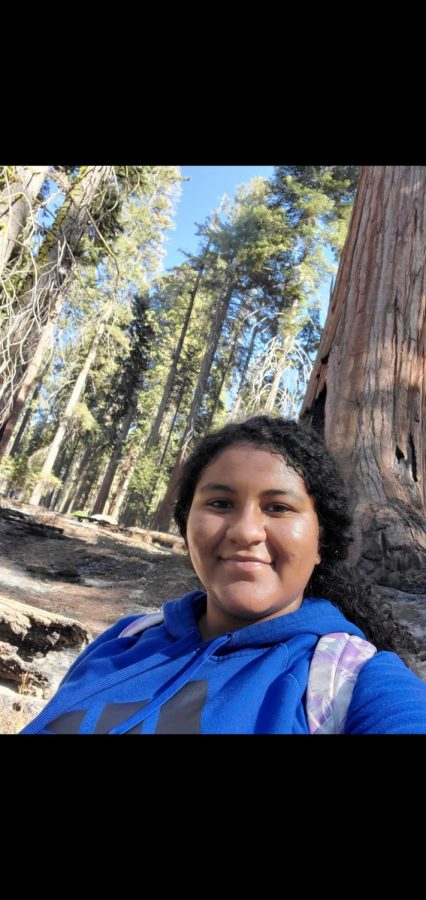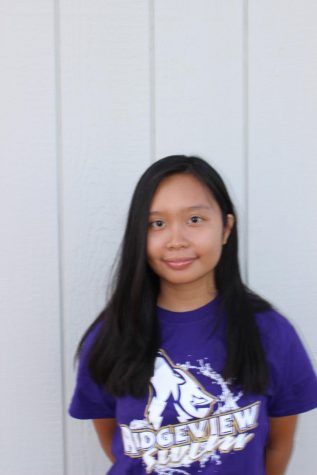Untold Stories of the Pack: Makaila Angevine
Mykalia Angevine takes a selfie during a recent trip outside.
December 14, 2020
“The single event that I feel shaped me into myself is when I experienced racism for the first time because it made me realize how real it is and it made me realize that I need to stand up for myself and others,” said Makaila Angevine, a Ridgeview senior.
“I don’t remember exactly how old I was, but I was in elementary school. And I remember I was walking to school and I guess I was with my friend who was black. Like she was full black and I’m mixed. So we’re walking and we walked on this guy’s lawn, which we didn’t know because we’re kids. But he’s just out there and angry. He starts yelling at us to get off his property and we’re just walking by. And then he starts yelling the ‘n-word’ at us. I’m like, ‘what?’, because I didn’t know what it meant. And my friend told me that that’s a derogatory word. It’s a mean word. And it’s sad because even though we were just in elementary school, my friend had already experienced this many times prior. I remember being scared because this old man was yelling at us and we were so young,” she recalls.
Makaila Angevine’s story is one that is familiar among people of color. Stories of being treated differently based on the color of your skin, getting harassed due to being a different race, and discriminatory behavior from ignorant people are unfortunately common. Often, these events shape people into who they are. This is what happened to Angevine who unfortunately discovered how ugly the world can be at a young age.
“There’s a misconception out there that racism is gone and I want people to realize that it hasn’t gone away. Some people are like, ‘But you guys have equal rights now so it’s gone,’ but no. It’s not. People don’t realize that racism isn’t black or white. There are also little things that people say or do here and there that are also racist. For example, growing up, I was the only black person in my family. My family members would make little jokes about my skin or my hair and I’m like, just because they don’t hate me because I’m black doesn’t mean that it wasn’t racist. They were making fun of my hair and my black features and that was still derogatory and racist,” says Angevine.
When she was young, she remembers how excluded she felt in her own family. “I remember feeling alone and out of place in my own family because I looked different from everybody else. I am darker, I have different hair texture, and I have different features from the rest of my family. So I felt out of place and unwelcome for the majority of my life.”
Unfortunately, Angevine states that she still experiences racism. “I remember in October, I was at Walmart. And I was buying an avocado because I had bought a Subway sandwich. I was thinking, ‘oh I just want to get this avocado because I don’t want to pay for it at Subway,’” she says with a chuckle. “So I had an avocado in my hand and this lady working at Walmart went up to me. She was very suspicious, kind of following me and I got scared like why is she following me? And she said, ‘Are you gonna buy that?’ and I was like, ‘Yeah. I was just walking around.’ And the way she said it, she was all, ‘Oh, it looks like you’re gonna steal it.’ I just had an avocado in my hand. There were other people with things in their hands but she didn’t go towards them. This happened to me one-on-one and only I was being followed throughout the store. I looked around and realized, ‘wow, I have the darkest skin in here.’”
“When I was 12, I experienced stuff like that over and over again and I got tired of it. I got really passionate about stuff like social justice and racism and this was also around the time that the Black Lives Matter movement started. A mix of the movement and my own experiences really led me to be passionate about racism and fight against injustice so people don’t have to go through what I went through,” says Angevine.
Angevine believes the best way to deal with racist and ignorant people is to talk and stay calm. “It’s really easy to get angry. But from my experience, I learned in the past couple of months that getting angry can elevate the situation more than it should. Try to stay calm. And that’s where you start to talk to people calmly and explain that what they’re doing is wrong or what they said is wrong. I understand what it’s like to get defensive. We all have that feeling. Try to control it so that they can understand you better, but at the same time, I get it. I just think being calm and being the bigger person will have a better outcome.
“Racism shouldn’t make you feel less of yourself. It shouldn’t make you feel like you’re not worth it. You shouldn’t make it feel like it’s your fault. It shouldn’t define you because you didn’t do anything wrong. Don’t let the fear control you.”
If Angevine had to give advice to a large group of people, she would say, “Be kind and respect those who are different from you because at the end of the day, we are all human. I would also say, ‘you do you, boo’ and tell them to love themselves because everyone is beautiful and worthy of love.” However, that doesn’t include everyone. “Except racists and pedos,” she states, “Y’all ugly.”









